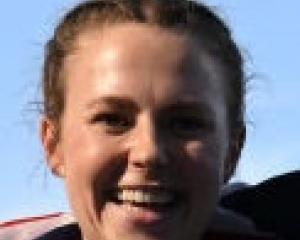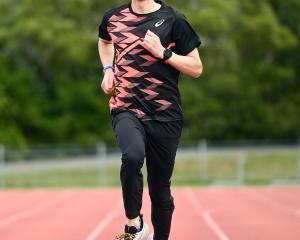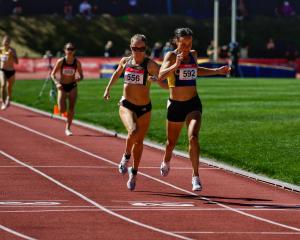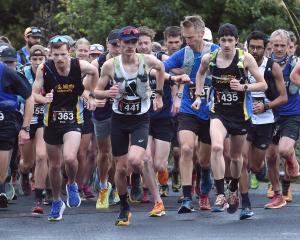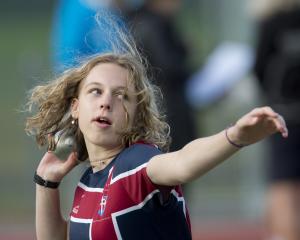Caden Shields (23), who spent three years in the United States on an athletics scholarship, has returned to Dunedin and will study physiotherapy at the University of Otago this year.
The highlights of his time in the United States involved both running and study.
Shields was a distinguished scholar-athlete during his time at Purdue University. He was in the top 50 students in the nation and was named an academic all-American. He was also in the top 20 in the country with his running.
The running highlight for Shields was to become the first male athlete from the "Boilermakers" in 22 years to qualify for the NCAA cross-country championship final.
He achieved this when he finished 10th at the Great Lakes regional 10km cross-country championships, in 31min 22.20sec.
Shields completed his health science degree with an A-minus average. He had a 3.7 grade point average out of a possible four points, and was the first cross-country runner in the history of Purdue to become an academic all-American.
The university, in the city of West Lafayette, in Indianae, has 39,000 students. It is one of the top 10 academic universities in the United States.
Shields competed on the track at indoor and outdoor meetings and in cross-country races. The university competes in the Big 10 Conference.
But it was not all beer and skittles for Shields, who struggled to adjust to the American training system at first. He was dogged by injury and illness at times which made him doubt his running ability.
But the overall results of the three years were positive and he has raised his expectations in the sport.
"I learned to be a smarter runner," he said. "That was my biggest gain."
One of the problems faced by Shields during his years in the US was the high standard of competition within the team.
"I was always fighting for my place in the team and it meant I had to go pretty hard in training and put my body on the line," he said.
It is different in New Zealand.
"I don't have to worry about that on a day-to-day basis here," Shields said.
"There was a pressure to perform in training to guarantee my spot on race day and get the respect of my team-mates."
Shields did not enjoy the constant pressure that was put on the athletes to perform.
"That frustrated me at times.
"If I was able to have more control over what I was doing I could have prevented those disappointments from happening.
"But the way the system was set up, I had to do what I was told.
"There were things that were happening that led to poor performances that I could have prevented if I had more control over my own training."
During his time in the United States, Shields learned to be more professional about his sport.
"I had to learn to control my training efforts and prepare better for races.
"I don't regret anything. I learned so much that I would not have learned here in Dunedin."
He was racing against the United States' best student runners every second weekend.
"I got the racing experience and learned to deal with stressful situations, high-pressure racing and the American college experience."
One of his biggest lessons was to learn how to deal with the stress of the race and plan for each race in a different way. He also learned how to analyse his races.
"This is hard to do in a cross-country race when you are racing against 300 runners," Shields explained.
"I had to break the race down and figure out how I could have placed higher by approaching the race differently."
He also learned how to understand his body's responses to training and how to deal with disappointment.
This included niggles in training and performances in some races that were not as good as he had hoped.
"I learned how important it was to have balance in my life," he said.
"If I had poor performances in a race I knew I could get over it by making adjustments to my training. I had to realise that there was more to life than just running."
He had a discussion with his Purdue coach, Irishman Conor Holt, after each race and they would analyse what happened and what could be done better in future races.
"When I first arrived in Purdue it was more of a teacher-pupil relationship," Shields said.
"We approached it differently as I matured as a runner and we would sit down and have a cup of coffee together."
Shields was pleased with his racing results in his first two years in the United States but niggling injuries and illness prevented him achieving the results he wanted in his final year at Purdue.
"It took me two months to get my act together again, but by the time of the Conference championships I was the No 1 runner again," he said.
He trained too hard and suffered a stress fracture, which meant he raced only twice in his final year in the United States.
His other top performance during his time at college came in the Penn Relays when he ran the third-fastest time of 29min 56sec, a time that put him top equal on the the New Zealand 10,000m ranking list.
During his three years in the United States Shields lowered all his track times: 1500m (from 4min 7sec to 4min 2sec), 3000m (from 8min 36sec to 8min 18sec), 5000m (from 14min 39sec to 14min 21sec), 10,000m (from 31min 25sec to 29min 56sec).
Caden Shields
The facts
Age: 20.
Home town: Dunedin.
Education: King's High School, University of Otago, Purdue University.
Sport: Athletics.
Coaches: Richard Barker (Dunedin), Conor Holt (USA).
Highlights: New Zealand junior 10,000m champion 2007-08; represented Purdue University in NCAA cross-country final 2009.
Best times: 800m (2min 8sec), 1500m (4min 2sec), 3000m (8min 18sec), 5000m (14min 21sec), 10,000m (29min 56sec).




